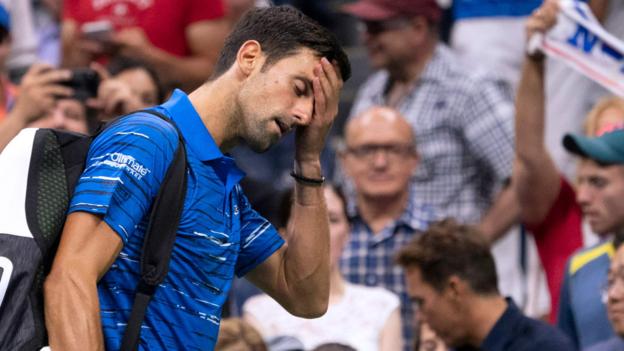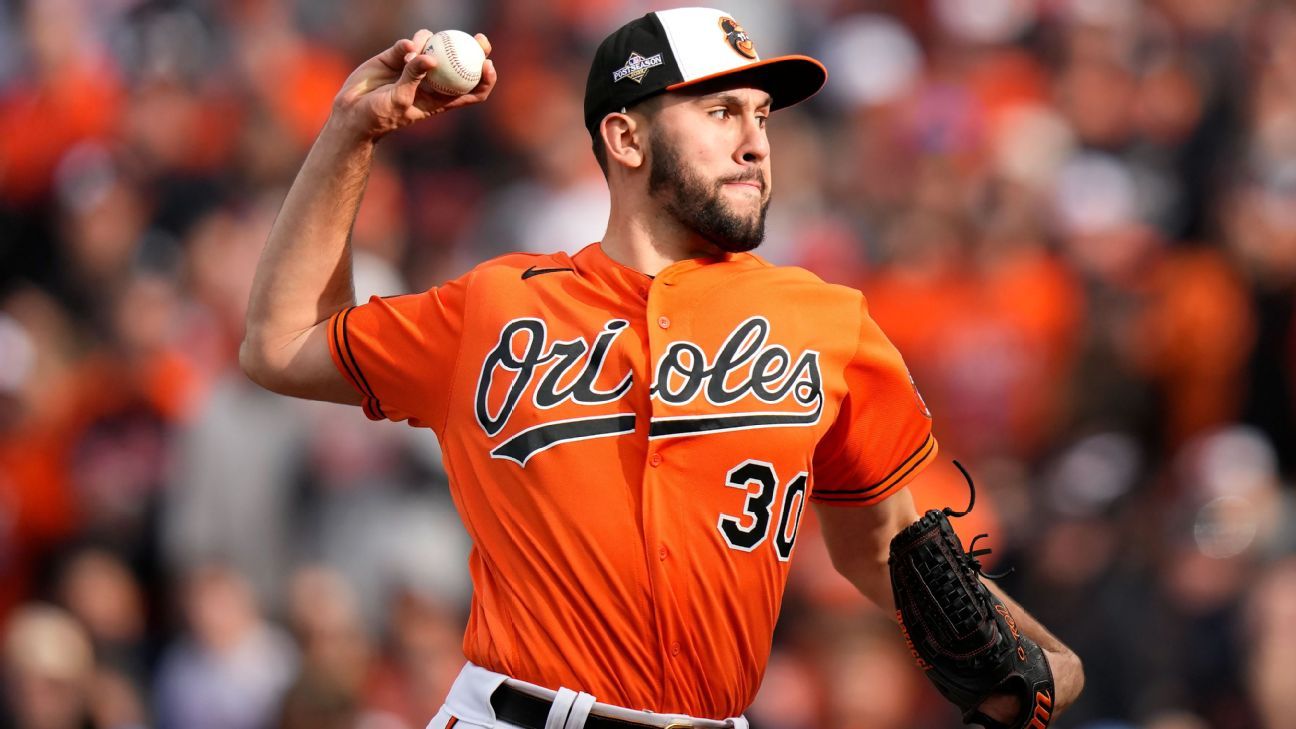
Defending champion Novak Djokovic is out of the US Open after quitting because of injury against Swiss 23rd seed Stan Wawrinka as defeat loomed in an electrifying fourth-round match.
Djokovic, 32, retired with a shoulder problem seconds after a double fault left him two sets and a break down.
Loud boos greeted the Serb's decision, with more heard as he walked off court.
"I'm sorry for the crowd. They came to see a full match but it wasn't to be," said world number one Djokovic.
Three-time Grand Slam champion Wawrinka had dominated the last-16 contest in a boisterous atmosphere at Arthur Ashe Stadium, producing a powerful display reminiscent of his best to lead 6-4 7-5 2-0, when Djokovic decided he could not continue.
Wawrinka, 34, will play Russian fifth seed Daniil Medvedev in the quarter-finals.
'You know when you're not able to hit the shot any more'
Djokovic was the hot favourite to retain his title at Flushing Meadows and earn a 17th Grand Slam title which would move him closer to Roger Federer (20) and Rafael Nadal (18) in the race to be deemed the greatest men's player of all time.
But he had been hampered throughout the tournament with a left shoulder injury, which he says has left him in "constant pain for a few weeks".
Djokovic particularly struggled during his second-round match against Argentina's Juan Ignacio Londero on Wednesday, needing intense treatment three times before coming through in straight sets.
Before his next match against American Denis Kudla, there had been speculation he might withdraw because of the problem, only to show few signs of the issue in a comfortable win on Friday.
But Djokovic said the intensity of the pain returned against Wawrinka.
"It is very frustrating. Of course it hurts that I had to retire," said the Serb.
"Some days the pain has been higher, some days with less intensity. Obviously I was taking different stuff to kill the pain instantly. Sometimes it works, sometimes it doesn't.
"You just know when you know, when you feel like you're not able to hit the shot any more."
Djokovic did not want to discuss the near 24,000 crowd's reaction to his early exit, while Wawrinka said he was surprised by negativity.
"He's an amazing champion," added the Swiss.
"If he has to retire, it's not the best for a tennis player to have to leave the court like that."
Wawrinka delighted with impressive performance
Djokovic's withdrawal failed to take the shine off a breathtaking performance from Wawrinka, who earned his biggest victory since beating Britain's Andy Murray, then world number one, in the 2017 French Open semi-finals.
Shortly after that run, Wawrinka's career stalled because of a left knee injury, which left him needing two operations.
It has been a slow climb back up the rankings for the former world number three, but proved he could still cause problems for the best - whatever their physical state - in a powerful display.
Wawrinka came out firing from the start, piercing Djokovic's famed defence with blistering groundstrokes as he broke for 3-2 and producing thumping aces to stave off a break point in the next game on his way to clinching the opener.
Wawrinka had beaten Djokovic three times at a Grand Slam - including their last meeting in the 2016 final at Flushing Meadows - having lost the opening set in each of them.
This proved different, despite Djokovic coming out fighting by holding to love in the first game of the second set, and then breaking to gain an early advantage.
Wawrinka, backed by a vociferous New York crowd, was soon level after breaking back in a pivotal seventh game in which Djokovic coughed up two double faults serving for a 5-2 lead, and the Swiss landed a beautiful one-handed backhand down the line which left some fans climbing to their feet in admiration.
Djokovic started to look rattled by the injury and the atmosphere, coming up with poor shots as he tried to respond, allowing Wawrinka another break and the chance to serve out for a two-set advantage.
Treatment at the changeover was a last-ditch attempt by Djokovic to improve his physical - and perhaps mental - state, but it did not prove successful and he quit a few minutes later.
"I'm sorry he had to retire to finish the game like that, but for me, most important is the way I'm playing, the way I'm moving," Wawrinka said.
"The more the match was going, the better I was playing. I was hitting the ball really hard. I was feeling great on court."
Analysis
Russell Fuller, BBC tennis correspondent
Wawrinka had been in rampant form. He was pummelling the ball and reminding us of the man who, before knee surgery, had won three Grand Slam titles.
Djokovic was, however, very subdued. He seemed to be observing events, rather than influencing them.
Only he knows whether he could have finished the match, but to leave the court with boos ringing in his ears was a very harsh send-off for a 16-time Grand Slam champion.
The odds on Nadal and Federer will now shorten further. But perhaps we do need to look outside the top three for a potential champion.
Wawrinka might be 34, but when he reaches the second week of a Grand Slam in this kind of mood he can be very difficult to stop.















 Phone: (800) 737. 6040
Phone: (800) 737. 6040 Fax: (800) 825 5558
Fax: (800) 825 5558 Website:
Website:  Email:
Email: 






